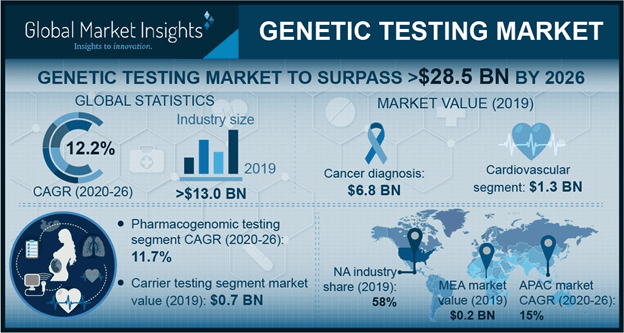Genetic testing market to witness lucrative growth from cancer diagnosis applications over 2018-2024, rapid innovations in genomics to further drive industry growth
Publisher : Fractovia | Published Date : 2018-07-23Request Sample
Genetic testing market has undoubtedly been one of the most transformational & pronounced verticals of the healthcare fraternity in terms of remuneration portfolio. With an industry valuation of USD 10.6 billion in 2017, genetic testing industry has brought about a massive revolution in healthcare since its inception, and is slated to witness a rather commendable commercialization potential in the ensuing years. The market, in fact has been known to actually come into limelight when this technology provided an unprecedented insight into a person’s family history and could also identify potential health risks. With just few swabs of body fluid extract, genetic testing industry brought a complete new dimension in mapping of genes, proteins, and chromosome, helping in determining the presence of diseases that could not depict external symptoms.
U.S. Genetic Testing Market, By Test Type, 2013 – 2024

Speaking of the robust product demand, it is imperative to mention that genetic testing industry players such as the Genos, 23andMe, and AncestryDNA have been proven particularly popular, with tens of thousands of people purchasing their at-home testing kits every year. Innovations brought forth by these leading startups have lent a great deal of efficiency to the general public. A recent instance that has grabbed the headlines in this regards is that of 23andMe, that has received its first FDA approval of its test for some BRAC1/BRAC2 mutations. These genes that the test covers have been linked to an increased risk of ovarian, breast, and prostate cancer.
The company came into the public eye in late 2015, when it introduced a DTC (direct-to-consumer) test providing parents with the necessary information about the genes their future children might carry. The FDA has granted an exemption allowing it to provide genetic tests for 10 diseases including Alzheimer’s and Parkinson’s. Whether perceived with suspicion or hope by patients and governments, the new frontiers opened by these technological innovations are undeniably leading to unprecedented opportunities in the global genetic testing industry.
With this technology further providing an in-depth understanding of genomics, cancer diagnosis applications have emerged as one of the most enterprising revenue-generating verticals of the genetic testing market. In fact, reports claim this segment to have dominated the genetic testing market with revenue estimates surpassing USD 5562.8 million in 2017. Rising prevalence of cancers including breast, ovarian, lung, and prostate, and increasing awareness regarding early diagnosis have been identified as the chief drivers uplifting genetic testing market growth from this segment. A report compiled by the Institute for Health Metrics and Evaluation (IHME), which throws light on the growing number of cancer deaths, stands as a valid testimony in this regard. According to IHME, the year 2016 recorded more than 8.9 million cancer deaths, 5% to 10% of which were caused due to inheriting genetic mutation.
The global genetic testing market has also been gaining precedence in the diagnosis of cardiovascular diseases, identifying health risks, and analyzing treatment response. If estimates are to be believed, diagnostic testing accounted for highest market share with a revenue of over USD 5690.6 million. Prenatal and newborn testing is another emerging segment that is witnessing lucrative growth. The rising prevalence of genetic disorders and chromosomal abnormalities in the newborns has been declared as one of the leading causes of infant mortality and morbidity, in turn driving demand for prenatal testing. Amidst this backdrop, reliable reports claim that prenatal & newborn genetic testing market is poised to register a y-o-y growth of 11.6% over 2018-2024.
Undeniably, the pronounced success and wide applications of genetic testing in the medicine industry has heralded this market to emerge as a highly lucrative verticals in recent times. The advent of big data and cloud computing have further helped this business sphere to monitor patient data and drug development at the microscopic level. It will be rather interesting to see how the genetic testing industry advances in techniques in single cell isolation as well. All in all, endowed with the potential to provide an in-depth knowledge about cancer, embryo development, neural system, and stem cells, genetic testing market is expected to surpass USD 22 billion by 2024.